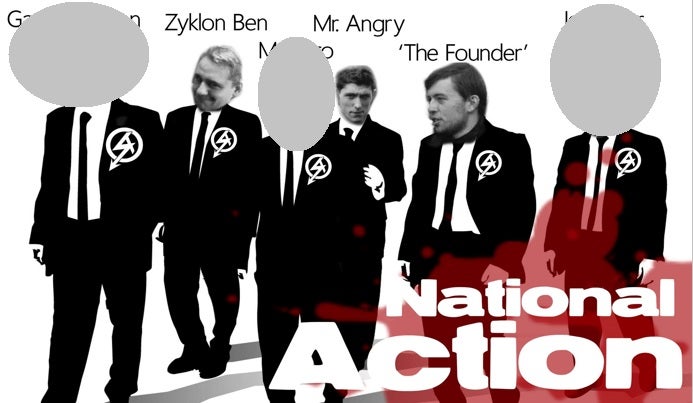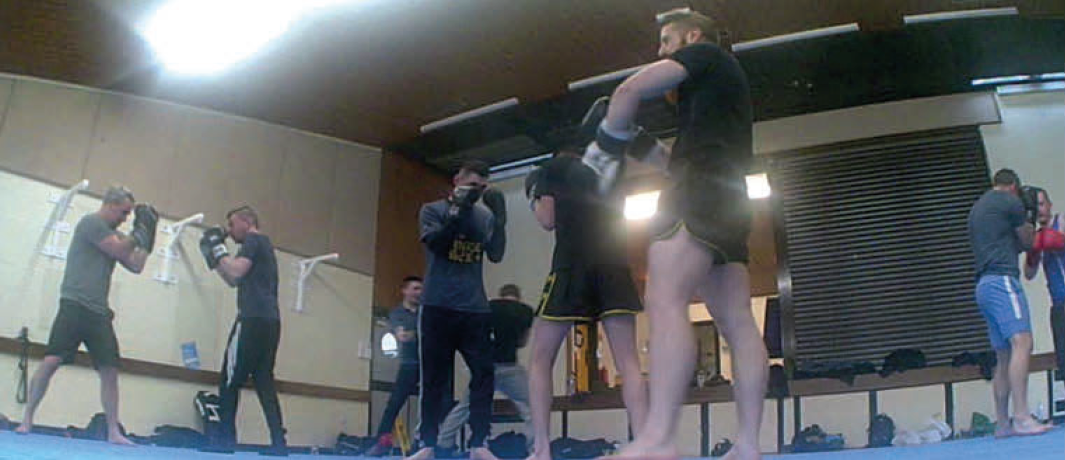The rise and fall of Britain’s first neo-Nazi terrorist group
How a mobile phone hidden in an airing cupboard helped counterterror police ‘dismantle’ National Action, Lizzie Dearden reports

On 4 May 2017, shortly before 10am, counterterror police stormed a nondescript flat in the Birmingham suburb of Moseley.
They were looking for Alex Deakin, a 22-year-old neo-Nazi suspected of putting up racially inflammatory stickers reading “White Zone” and “Britain is ours – the rest must go” around Aston University’s campus.
Deakin’s friend answered the door to police and claimed he was not there, but officers found him hiding in an airing cupboard.
His trial heard that he uttered “bloody hell” as he was discovered, then when asked for his mobile phone, claimed he had thrown it into a bin – and he didn’t know where the bin was.
In fact, the phone was in the airing cupboard with Deakin, who had tried unsuccessfully to conceal it under the floorboards.
Unknown to those involved, the farcical scene was the beginning of the end of National Action – Britain’s first neo-Nazi terrorist group.
It had been started in 2013 by Alex Davies, then an 18-year-old student about to embark on a politics degree at the prestigious University of Warwick.
He told his eventual terror trial that he was, and remains, a national socialist and wanted to create a “nationalist Britain, which would be a white Britain”.
He claimed that young neo-Nazis like himself were “politically homeless” after the British National Party (BNP) – which he previously joined – “imploded” with infighting.
“I was too young to form a political party, so when thinking about what I could do that was realistic in terms of achieving and building something, I thought maybe I could build something for other young people,” he told the jury.
National Action launched formally when its website went live in August 2013, after Davies enlisted the help of Ben Raymond – a neo-Nazi who ran a website advocating the ideas of British Union of Fascists leader Oswald Mosley.
Its logo was a nod to Adolf Hitler’s “Sturmabteilung”, meaning storm detachment – the Nazi Party paramilitary wing that helped the dictator’s rise to powers by intimidating, disrupting and fighting political opponents.
Raymond, who was also later convicted of membership of a terrorist group, became National Action’s chief propagandist and was likened to Nazi ideologue Joseph Goebbels at his trial.
Unlike older neo-Nazi groups such as Combat 18, they initially focused on online activism – drawing in young members through online forums and social media networks while using striking artwork and memes.
National Action quickly accumulated enough followers to start, albeit small, street demonstrations, where members clad in black clothing and face masks performed Hitler salutes and gave racist speeches through megaphones.
There was every good reason Deakin tried to hide his mobile – it was packed with incriminating material that did not just affect him but the entire continuity group
Aiming for maximum disruption and impact, the group targeted ethnically diverse areas and university campuses with stickering campaigns and spread online propaganda, while holding combat training sessions and forging links with neo-Nazi groups in the US and Europe.
It threw itself into the media spotlight by holding “Miss Hitler” beauty pageants and sharing photos of its members giving Nazi salutes inside a German concentration camp on Twitter.
As well as seeking publicity, many members were adherents of an “accelerationist” strain of neo-Nazism and believed that increasing community tensions could push the UK towards all-out race war.
National Action’s overt calls for violence, including propaganda images referring to the execution of “race traitors” and police, sparked concern among counterterror police, but it was its reaction to the murder of Jo Cox that pushed the government into action.
On the day the Labour MP was assassinated by a neo-Nazi, a Twitter account operated by its northeast branch tweeted: “Only 649 MPs to go.”
Although her murderer, Thomas Mair, was not a National Action member, the group publicly hailed him as a hero whose “sacrifice” must not go in vain.
In December 2016, the British government announced that the group was being proscribed under terrorism laws, making membership and support a criminal offence punishable by up to 10 years in prison.
The Home Office said National Action was “concerned in terrorism” and had encouraged attacks after Cox’s murder.

Amber Rudd, then the home secretary, said: “National Action is a racist, antisemitic and homophobic organisation which stirs up hatred, glorifies violence and promotes a vile ideology. It has absolutely no place in a Britain that works for everyone.
“Proscribing it will prevent its membership from growing, stop the spread of poisonous propaganda and protect vulnerable young people at risk of radicalisation from its toxic views.”
The ban came as a shock to National Action members, who later admitted they were expecting dawn raids immediately following the announcement.
But the vast majority were not detained for almost two years, after Deakin’s phone gave police the evidence needed to identify them and trigger a wave of criminal prosecutions.
The device allowed detectives to access encrypted chats where neo-Nazis had secretly plotted to continue their mission after National Action was banned.
A total of 19 people have now been jailed for membership, while other supporters received sentences for crimes including plotting a terror attack targeting a Labour MP.
And counterterror police largely have Deakin’s mobile phone to thank for it. The device, codenamed JRA/3, contained evidence that the group had continued after the ban.
As a prosecutor said in the recent trial of National Action founder, Alex Davies: “The phone contained hundreds, if not thousands, of incriminating messages.”

In April this year, Barnaby Jameson QC told Winchester Crown Court: “There was every good reason Deakin tried to hide his mobile – it was packed with incriminating material that did not just affect him but the entire continuity group.
“One of the reasons we are here today is because of Deakin’s sloppy opsec [operational security].”
Mistakes by another convicted member of National Action, Garry Jack, had started the ball rolling a month before, when police seized his phone during the same Aston University stickering investigation and accessed neo-Nazi online chats.
But it was Deakin’s devices that showed how, on the day the government announced its plans to proscribe National Action and make membership and support a terror offence, senior members quickly organised contingencies.
Leader Christopher Lythgoe sent five trusted insiders, including Deakin, an encrypted email instructing them to maintain contact with members and “reassure them” on how they could avoid prosecution.
“Make sure that they understand that the SUBSTANCE of NA is the people, our talents, the bonds between us, our ideas, and our sustained force of will,” he wrote. “All of that will continue into the future. We’re just shedding one skin for another.”
And so they did. The group split into regional factions that started to operate under new names in a bid to evade prosecution, following an approach that had been largely successful for Islamist groups including Anjem Choudary’s al-Muhajiroun network.
Deakin quickly set up two new groups on the encrypted Telegram messaging service. One, Triple K Mafia, was the working name of the Midlands and Yorkshire branch of National Action, and a second group called Inner.
Members of Triple K Mafia were arrested over the coming months, and all seven members of “Inner” have been jailed for continued National Action membership after the ban.

The sprawling web was uncovered as more and more evidence was seized, resulting in the National Action successor groups NS131, System Resistance Network and Scottish Dawn being proscribed in their own right.
Telegram chat participants had used codenames in a bid to obscure their identities and exchanged instructions on operational security.
But after Deakin’s phone was seized, his online nicknames of “Charles” and “Steampunk Daddy” were exposed and police started piecing together other identities.
Deakin quickly realised the magnitude of his mistake. As soon as he was released on bail, he sent an encrypted email via the Tutanota service warning his fellow National Action members and asking for help.
He admitted that counterterror police had seized his phone, computer, hard drive, leaflets and other evidence and narrated his humiliating arrest, writing: “I was staying at a friend’s house and at 9:45 they let themselves into his apartment. I was intoxicated at the time and so acted irrationally by hiding in an airing cupboard where they found me, along with my phone and wallet concealed below floorboards, along with my coat and bag which I matches with the items I was wearing the CCTV footage [of the stickering attack at Aston University].”
Deakin claimed he had been “found due to undeleted texts that were on Garry’s phone” and said he had deleted his accounts on Wire, Instagram and Facebook.
“I can’t delete my Telegram,” he panicked. “Seized phone is full of texts that will mark me as an organiser … tell everyone in the region to get new SIM cards and block me on all platforms.”
Not only were police methodically working through piles of evidence from Deakin’s phone, but a trusted member of National Action had turned informant for the counter-extremism group Hope Not Hate
At the end of the message, sent to a generic National Action email address, he wrote to his fellow neo Nazis: “I can understand if you despise me for this sloppiness (it really couldn't have been any worse if I tried).”
National Action’s new factions continued operating, but attempted to protect themselves against police monitoring and arrest.
Nathan Pryke, who was himself jailed for membership in 2018, wrote an email in July 2017 with a passage entitled “security”.
It warned that “button and spy cameras could be worn” by new members or defectors, and that the name National Action (NA) should not be mentioned at meetings.
“If an unverified member asks you a question about NA you should always give a non-committal answer such as ‘I don’t know anything about NA’ or ‘sorry we aren’t NA, they’re a terrorist organisation, aren’t they?” Pryke wrote.
He said members would be given “burner phones” and that others had to be switched off and secured, while discussing the possibility of using metal detectors to detect recording devices.
In reality, it was already too late. Not only were police methodically working through piles of evidence from Deakin’s phone, but a trusted member of National Action had turned informant for the counter-extremism group Hope Not Hate.
Following a meeting at a Warrington pub on 1 July 2017, he would alert authorities that another member called Jack Renshaw was plotting to murder his local Labour MP.
Mr Mullen also revealed how National Action’s northwest branch had set up a gym and headquarters in the same town, where members trained in boxing, mixed martial arts and knife fighting.
The defector later told the trial of his former comrades that they wanted to achieve a “white Britain by any means necessary… war, anything”.
Waves of arrests started in September 2017, and within weeks successor groups NS131 and Scottish Dawn had been banned as terrorist organisations by the government.

A 2020 trial of four members heard how the first batch of arrests on 5 September 2017 sparked “panic in National Action circles”.
Deakin was re-arrested for membership, while British Army soldier, Mikko Vehvilainen, was picked up at an army base in Cyprus.
That evening, Pryke sent a message to members that he later admitted to founder Alex Davies was “mainly for the counterterrorism unit’s benefit”.
He spoke of “understandable concern” but said there was no need to be worried because National Action was a “dead movement”.
Nevertheless, he urged: “Delete any affiliations you have to the group. Throw away or burn any memorabilia you are holding on to. If you are willing to throw away our efforts up until now because of a false sense of past glories or some sense of loyalty to a group that doesn't exist anymore, please quit the group.
“If anyone is caught breaking the NA proscription or advocating for NA or even holding any NA memorabilia they will be kicked from the group. Stay safe and be smart. Don't be retards posting on social media accounts, they are watching the far right's every step now and if even one of us slips up it will cost all of us. This is an all for one and one for all situation. We are brothers in this together.”
They ended up being together in court. It would take years, but eventually even the most careful and most senior founding members would be convicted of terror offences.
Superintendent Anthony Tagg, a member of the West Midlands Counter Terrorism Unit whose officers found Deakin in an airing cupboard five years ago, says National Action has now been “dismantled”.
He marks the recent conviction of founder Alex Davies as the end of a series of investigations into the neo-Nazi group’s members.
“We have brought a number of individuals to justice who had been members of National Action and held various roles, who have sought to further the views of National Action, the creation of a white homeland and that white supremacist ideology,” Supt Tagg says.
“Over the course of a number of investigations we’ve managed to dismantle National Action but we are clear that there probably are still individuals cross the country who hold extreme right-wing, white supremacist ideology.
“Working with communities who bring concerns to us about things they’re hearing and seeing, we will investigate and seek to prosecute and bring to justice those who espouse hatred and extremism in whatever guise it takes.”



